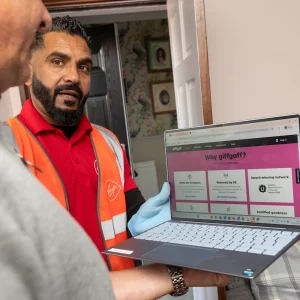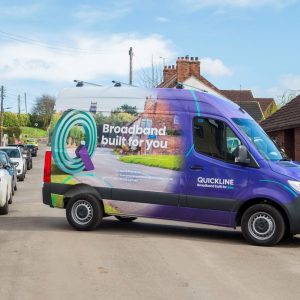Sponsored Links
Wales Tourism Alliance Claims Poor Rural Broadband Holds Back Tourism
Posted: 17th Nov, 2011 By: MarkJ

 The Wales Tourism Alliance (WTA) has told the BBC that a lack of good broadband internet access in rural Wales could be having a negative impact upon local tourism because "tech-savvy" visitors now expect to be able to get online wherever they stay.
The Wales Tourism Alliance (WTA) has told the BBC that a lack of good broadband internet access in rural Wales could be having a negative impact upon local tourism because "tech-savvy" visitors now expect to be able to get online wherever they stay.The Welsh Government officially announced its Digital Wales strategy at the end of last year, which aims to bring superfast (30Mbps+) broadband to all Welsh businesses by the middle of 2016 and households by 2020. It's since won £56.9 Million in funding from the Broadband Delivery UK (BDUK) office to help it achieve said targets.
At the same time they also have a £2m Broadband Support Initiative running, which offers grants of up to £1,000 for residents and businesses (per property) who live in parts of Wales where only basic 2Mbps or slower (i.e. no broadband) internet connection speeds are possible.
Chris Osborne, WTA Chair and Owner of Fourcroft Hotel (Tenby), said:
"Tech-savvy visitors are increasingly using the internet for inquiries and bookings, putting tourism businesses in the many rural 'notspots' of Wales at a significant disadvantage. They find it frustratingly difficult to update websites and even reply to email.
If this satellite broadband service can deliver what it claims, it will make a significant difference, not only to rural tourism businesses, but also their customers who demand good internet connections during their trip."
"Tech-savvy visitors are increasingly using the internet for inquiries and bookings, putting tourism businesses in the many rural 'notspots' of Wales at a significant disadvantage. They find it frustratingly difficult to update websites and even reply to email.
If this satellite broadband service can deliver what it claims, it will make a significant difference, not only to rural tourism businesses, but also their customers who demand good internet connections during their trip."
Certainly Satellite broadband is an excellent technology for the remotest areas and one that becomes significantly more affordable once the 'Broadband Support Initiative' grants are taken into account. However high latency, heavy traffic throttling and comparatively meagre usage allowances (varies between ISPs) often make it a poor choice for data hungry families and some businesses.
Marcus Jewell, UK Country Manager of Brocade, added:
"Broadband rollout has always been prioritised for urban areas, with towns and cities getting network upgrades long before more remote areas. While it’s important that centres of population and economic production have high speed Internet, rural communities are equally as dependent on efficient networks for their economic success.
Much of rural Britain’s economy depends on tourism, and tourists increasingly expect to have Internet access wherever they are. Brocade conducted a survey this year that found that half of those surveyed plan to access the Internet at least once a day on holiday, while more than 40 percent actively seek destinations that offer always-on connectivity,
Poor or absent connectivity threatens to do serious harm to tourism in rural Britain. That’s not a matter of opinion – it’s the message coming from Wales Tourism Alliance, which has said that ‘notspots’ puts local businesses at significant disadvantage."
"Broadband rollout has always been prioritised for urban areas, with towns and cities getting network upgrades long before more remote areas. While it’s important that centres of population and economic production have high speed Internet, rural communities are equally as dependent on efficient networks for their economic success.
Much of rural Britain’s economy depends on tourism, and tourists increasingly expect to have Internet access wherever they are. Brocade conducted a survey this year that found that half of those surveyed plan to access the Internet at least once a day on holiday, while more than 40 percent actively seek destinations that offer always-on connectivity,
Poor or absent connectivity threatens to do serious harm to tourism in rural Britain. That’s not a matter of opinion – it’s the message coming from Wales Tourism Alliance, which has said that ‘notspots’ puts local businesses at significant disadvantage."
Back in July 2011 the Welsh Government said that it had so far approved 800 applications, at a total cost of £600,000 (i.e. £1.4m left), for its support scheme grants. Since then a total of 1,700 people are now known to have applied, although it's unclear how many have been approved.
Opponents to the support scheme fear that it could lead to a duplication of investment, with local government potentially having to come back to the same areas again in order to improve the infrastructure. On the other hand some ISPs have worked with communities to make more efficient use of the funds by installing wireless networks.
Search ISP News
Search ISP Listings
Search ISP Reviews
Latest UK ISP News







Cheap BIG ISPs for 100Mbps+
150,000+ Customers | View More ISPs
Cheapest ISPs for 100Mbps+
Modest Availability | View More ISPs
Latest UK ISP News
Helpful ISP Guides and Tips
Sponsored Links
The Top 15 Category Tags
- FTTP (6916)
- BT (3917)
- Politics (3119)
- Business (2821)
- Openreach (2703)
- Building Digital UK (2537)
- Mobile Broadband (2527)
- Statistics (2162)
- FTTC (2153)
- 4G (2132)
- Virgin Media (2065)
- Ofcom Regulation (1801)
- 5G (1782)
- Fibre Optic (1616)
- Wireless Internet (1615)
Sponsored
Copyright © 1999 to Present - ISPreview.co.uk - All Rights Reserved - Terms , Privacy and Cookie Policy , Links , Website Rules






























